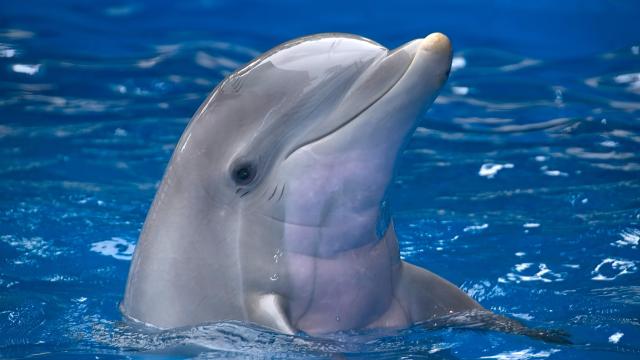A new study suggests dolphins can suffer from some of the same brain ailments as humans. Scientists in Scotland say they’ve found evidence across three species of dolphins that their brains can develop the classic markers of Alzheimer’s disease. The findings could help explain why dolphins regularly become stranded on land, but more research will be needed to confirm whether they truly experience Alzheimer’s-like illness.
Alzheimer’s disease is the most common type of dementia and is characterised by major, damaging changes in the brain. In particular, people with the disease have a buildup of the misshapen form of two proteins normally found in the body, called amyloid beta and tau. And it’s these abnormal clumps of amyloid and tau that are thought to be the driving force behind the brain’s destruction. Studies have shown that some of these same brain changes can be found in non-human animals, such as certain species of monkeys, other nonhuman apes, and dogs. But these animals don’t often seem to develop the neurological symptoms commonly seen in Alzheimer’s patients, which has led some experts to speculate that Alzheimer’s may be a uniquely human illness.
This new research comes from scientists at various universities and the Mordun Research Institute in Scotland. They theorised that the brains of dolphins might be similar enough to those of humans that they could suffer from this kind of dementia. To test their theory, the team studied brain samples taken from odontocetes, or toothed whales — a broad group of aquatic mammals that includes dolphins, porpoises, and sperm whales. In total, they looked at the brains of 22 toothed whales across five species, including 18 older specimens: Risso’s dolphins, long-finned pilot whales, white-beaked dolphins, harbour porpoises, and bottlenose dolphins. These animals had all ended up stranded off the coast of Scotland and died.
All in all, the team identified four animals from three species that had all or most of these markers of Alzheimer’s in their brains. These included two long-finned pilot whales, a white-beaked dolphin, and a common bottlenose dolphin, The team’s results were published earlier this month in the European Journal of Neuroscience.
The findings might provide support for a common hypothesis about why dolphins and whales regularly become stranded on land, known as the “sick-leader” theory. This theory argues that an otherwise healthy group of dolphins can be sent to their doom in shallow waters by a sick or confused leader. So it’s possible that dementia may be one reason why these leaders become less able to safely navigate as they get older.
As interesting as the work is, though, the authors are cautious about its implications for the time being. Simply showing that these brain changes can happen in dolphins doesn’t necessarily mean that they can develop something similar to Alzheimer’s. And even in humans, there’s still a lot that we don’t understand about the biology of this disease.
“These are significant findings that show, for the first time, that the brain pathology in stranded odontocetes is similar to the brains of humans affected by clinical Alzheimer’s disease,” lead author Mark Dagleish, a pathologist from the University of Glasgow, said in a statement from the university. “While it is tempting at this stage to speculate that the presence of these brain lesions in odontocetes indicates that they may also suffer the cognitive deficits associated with human Alzheimer’s disease, more research must be done to better understand what is happening to these animals.”
